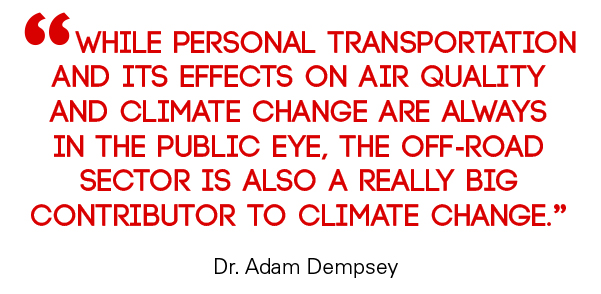A new combustion system for engines allows heavy-duty farm equipment normally powered by diesel fuel to run on gasoline and ethanol, without sacrificing performance.
By John Blum
Having grown up working on his uncle’s farm and in his father’s concrete business in northern Illinois, Dr. Adam Dempsey knows a few things about agricultural and construction equipment — and, as an assistant professor of mechanical engineering, a lot of things about the diesel engines that run them. He was recently awarded a $2.5 million Department of Energy grant to develop a new supportive combustion system that will allow diesel engines in farm equipment to run on ethanol and ethanol-gasoline mixtures. The result will be an engine that packs the punch of diesel while delivering cleaner fuel emissions.
“While personal transportation and its effects on air quality and climate change are always in the public eye,” Dempsey notes, “the off-road sector is also a really big contributor to climate change.”
To do that, he needs to address how the engine combusts the fuel. Typical automobile engines mix gasoline (and ethanol) with air inside a piston chamber, where it’s compressed and ignited by a spark plug. Diesel engines don’t have spark plugs. The fuel is ignited by the heat of extremely compressed air. The challenge with burning gasoline and ethanol in a conventional diesel engine is that these fuels are very difficult to ignite with just hot compressed air. They are very resistant to autoignition.

To achieve this “best-of-both-worlds” approach — diesel performance with cleaner fuel emissions — Dempsey has designed a new ancillary combustion system for a diesel engine. This system includes a prechamber, a small fuel injector and small spark plug that sit atop each cylinder. The unit injects a little bit of fuel into the prechamber and then it’s ignited by the spark plug. Hot flames shoot into the main chamber, helping to raise the temperature sufficiently to assist in igniting the rest of the gasoline-ethanol mixture coming from the main fuel injector.
Why convert a diesel “compression ignition” engine and not build a heavy-duty version of a gasoline-ethanol “spark ignition” engine? According to Dempsey, “spark ignition engine performance characteristics are not well matched to off-road equipment requirements.” The engine will, for instance, start knocking (also called pre-igniting) at low speeds and higher torque, which is exactly what farm equipment requires, and will be less efficient since it needs extra fuel to keep engines from overheating when a lot of power is asked for.
The new system is “fuel agnostic,” meaning it will work with any biofuel or biofuel mix with gasoline. For this project, he’s focusing on E15, a mix of 15% ethanol and 85% gasoline, given its ready availability, and E100, pure ethanol.
By project’s end, Dempsey hopes to have in hand a heavy-duty flex-fuel engine capable of reducing life-cycle CO2 emissions by about 15% compared with diesel fuel when operated on E15 and by about 50% when operated on pure ethanol.

Coming on board the project early was Deere & Co., makers of agricultural equipment. “They’re really interested in ethanol as an alternative fuel,” says Dempsey. “Their customers are the folks who grow the corn that makes ethanol.” For this project, Deere will build a six-cylinder, 9-liter engine for real-world testing of the prechamber ignition concept. Other partners will work on building and testing various prototypes. Dempsey will manage the project and run early experiments on a single-cylinder engine to demonstrate the merits of the concept.
The project is ready-made for the Department of Energy, which funds high-risk/high-reward projects to meet societal needs, such as reducing harmful emissions. Dempsey says corporations aren’t always able to take on the high-risk part — hefty research costs coupled with the possibility of failure. “When we can show proof of concept, things will clearly be de-risked, so the private sector can run with it and develop a product that will benefit society,” he says.
A relative newcomer to Marquette, Dempsey is proving his publication bona fides, with 10 papers published or accepted for publication since 2021. And he continues to push his research forward. He has assembled a team of business partners and the University of Wisconsin–Madison’s Engine Research Center that proposes to apply his prechamber ignition concept to natural gas engines. For that project, the concept will be used to reduce methane emissions, a potent greenhouse gas that has a global warming potential of up to 80 times that of CO2. Other ongoing research includes using gasoline instead of diesel fuel in compression ignition systems and experimenting with different types of fuel injector nozzles.
Before Marquette, Dempsey spent time at the Department of Energy’s Oak Ridge National Laboratory in Tennessee, and in the private sector as a combustion researcher. There, he worked in a group of gifted researchers but didn’t have much control over what projects they’d work on. Consequently, the independence and flexibility of an academic career that Marquette offered was appealing. “As long as you can find a funding opportunity that your research fits into, you can go after it. It’s like being in control of your own destiny.”
Dempsey is joining a team of leading combustion researchers in the Opus College of Engineering. Dr. Casey Allen, associate professor of mechanical engineering and a co-investigator on the project, explores the science behind ignition and how pollution forms; Dr. Somesh Roy, assistant professor of mechanical engineering, uses high-performance computing to run simulations of combustion systems from laboratory-scale flames to wildfires; and Dr. Simcha Singer, assistant professor of mechanical engineering, studies heterogeneous combustion with emphases on analyzing char particles and fuel droplets, as well as the heating and gasification of biomasses. With Dempsey, the team gets a specialist in engine research. “I was really excited to come to Marquette,” says Dempsey. “I think we can build something great, like a state-of-the art internal combustion engine lab or a clean energy center. Marquette’s definitely an up-and-coming research institution.”




